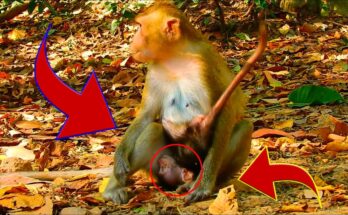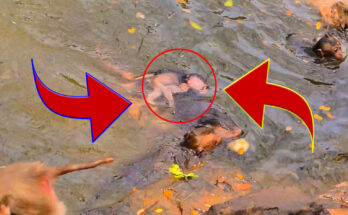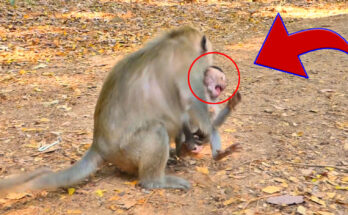Oh God, what happened to the child?” was the first thought that crossed Maria’s mind as she watched from a distance. A small baby monkey, barely a few months old, hung lifelessly from its mother’s grip, barely moving as it was carried through the dense trees of the jungle. Maria couldn’t believe her eyes—how could this happen? The mother seemed distant and cold, not showing the nurturing care one would expect for such a vulnerable infant.
As a child, Maria had always been captivated by the wonders of nature, especially primates. She had read countless books and articles about monkeys, fascinated by their close resemblance to humans. But nothing could have prepared her for the moment when she witnessed this interaction in the wild. Monkeys, it seemed, did not always exhibit the deep, instinctive love a mother should have for her child. This made her question everything she knew about animal behavior.
She couldn’t help but ask herself: Why don’t monkeys love their children?
To answer that question, one must first understand the complexities of primate behavior, which vary greatly across species. While it’s true that monkeys are social animals and generally live in close-knit groups, their approach to parenting is far different from humans. In fact, some species of monkeys show a surprising level of indifference or even neglect towards their young, especially in the first few weeks of life. This is particularly evident in certain species like macaques, where mothers, though protective, do not always demonstrate the same level of warmth or bonding seen in other animals.
In these species, infant monkeys are often left to fend for themselves after an initial period of dependency. Unlike humans, where the parent-child bond is forged through prolonged care and constant physical contact, many monkeys take a more hands-off approach. Their instincts prioritize survival and adaptation to the environment. For some, the harshness of the wild dictates that only the strongest infants survive. A mother monkey may move away from her infant after birth to avoid becoming an easy target for predators. She might briefly nurse the child, but after that, the baby must quickly learn to keep up with the troop or risk being abandoned.
Maria observed the baby monkey closely as it was carried, noting its thin, fragile limbs and its eyes, which seemed void of the usual brightness she’d seen in young animals. The behavior of the mother, who seemed unconcerned, was heart-wrenching. In a world driven by survival, love in the human sense seemed almost irrelevant. The mother’s detachment wasn’t a result of cruelty, but rather instinct—an instinct that prioritized the well-being of the group over individual bonds. This harsh survival mechanism is common in the wild, where resources are scarce, and every member of the group must remain strong to endure the daily challenges of the environment.
However, it’s important to note that not all monkeys exhibit this lack of affection towards their offspring. Some species, like the Capuchin monkey, are much more nurturing and display strong, maternal care. Capuchins are known to carry their babies close to them for months, grooming them and ensuring their safety at all costs. The variation in parenting styles across different monkey species suggests that their approach to raising children is not entirely devoid of love; rather, it’s based on the varying demands of their environment and evolutionary history.
Maria continued to ponder, trying to understand what had led to this moment. She remembered that in some species, like the notorious baboons, infanticide is not uncommon. Older males or even other females may kill the infants of a rival to increase their own reproductive success. In such environments, a mother’s love might be conditioned by survival instincts that prioritize not just her own offspring but the strength and health of the entire group. She realized that monkeys, in a way, are often forced to make incredibly difficult choices for the sake of their own survival and that of their troop.
As Maria sat there, watching the fading light of the jungle, she began to understand a little more about the paradox of the wild. The love that humans so often take for granted is not always a given in the animal kingdom. Survival instincts are often more powerful than affection. The mother’s seeming neglect of her infant monkey was not rooted in malice but in the deep, primal need to keep herself and her troop alive. It was a sad, cold reality of the natural world.
“Oh God, what happened to the child?” Maria whispered again, a lump forming in her throat. She realized that, in the wild, there were no guarantees. The child would either survive or perish, and the mother’s role, as cold as it seemed, was simply to ensure the survival of the strongest among them. It was a painful, yet fascinating, glimpse into the realities of life in the jungle.


